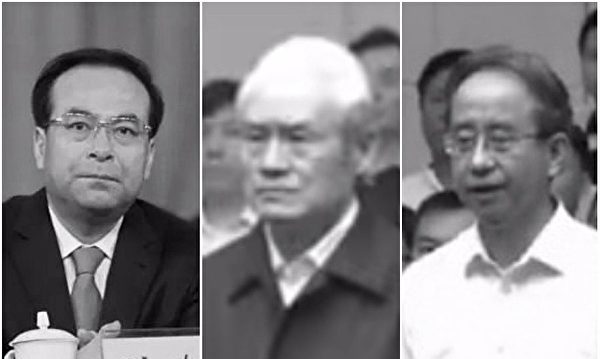[Epoch Times November 17, 2021](Epoch Times reporter Fang Xiao reported) In the so-called one-hundred-year historical resolution of the CCP, Zhou Yongkang and other eight “big tigers” who lost their horses were written into the historical resolution as negative models.
On the afternoon of November 16, the Xinhua News Agency of the Communist Party of China announced the full text of the so-called “Resolution of the Central Committee of the Communist Party of China on Major Achievements and Historical Experience of the Party’s Centennial Struggle.”
In the “Comprehensive and Strict Party Governance” section, it was mentioned that “corruption is the biggest threat to the CCP’s long-term governance” and “investigated and dealt with serious violations of discipline and law such as Zhou Yongkang, Bo Xilai, Sun Zhengcai, and Ling Jihua.”
In the “National Defense and Army Building” section, the resolution also mentions corruption in the military, and it is necessary to “resolutely investigate and deal with serious violations of laws and regulations such as Guo Boxiong, Xu Caihou, Fang Fenghui, and Zhang Yang, and thoroughly eliminate their toxic effects…”
After the 18th National Congress of the Communist Party of China, the Xi authorities launched an anti-corruption campaign and put forward the slogan of “tiger” and “fly” together. Anti-corruption has also become one of Xi Jinping’s important political achievements since he took office.
Careerists such as Zhou Yongkang and Bo Xilai still circulate poison
In recent years, six “big tigers” Zhou Yongkang, Bo Xilai, Sun Zhengcai, Xu Caihou, and Guo Boxiong who fell in the anti-corruption campaign have been called careerists and conspirators in the official documents and articles of the Chinese Communist Party. These six “careerists” have been repeatedly named by the Chinese Communist Party.
On October 29, 2019, the CCP officially published the work report of the Central Commission for Discipline Inspection approved by the 19th National Congress of the Communist Party of China. The first part of the report named and criticized “Zhou Yongkang, Sun Zhengcai, Ling Jihua and others seriously violated the party’s political discipline and rules, their political ambitions were swollen, and they engaged in conspiracy activities.”
After Zhou Yongkang, Bo Xilai, Sun Zhengcai and others fell from the horse, the Xi authorities have repeatedly asked for their poison and influence to be eliminated, especially in 2021.
In February 2021, the Ministry of Public Security of the Communist Party of China was reported by the Central Inspection Team that the remaining poison of Zhou Yongkang and other “tigers” was not in place. The Ministry of Public Security convened a meeting to emphasize that it would resolutely eliminate the influence of the drug, and named Zhou Yongkang and many other “big tigers.”
On April 19, 2020, Zhao Kezhi presided over a meeting of the Party Committee of the Ministry of Public Security to inform Vice Minister Sun Lijun of the investigation. It was mentioned at the meeting to eliminate the poisonous influence of Zhou Yongkang and others.
In recent years, the CCP’s military has repeatedly mentioned that the military must eliminate the poisoning of Guo Boxiong, Xu Caihou, Fang Fenghui, and Zhang Yang. Even Xu Caihou is dead.
On December 3, 2020, the CCP Military News published an article again mentioning the four “army tigers” Guo, Xu, Fang, and Zhang.
Xu Caihou and Guo Boxiong were both vigorously promoted by Jiang Zemin, the former leader of the Communist Party of China and Chairman of the Military Commission, and they are both important cronies of Jiang in the army.
Editor in charge: Li Muen#
.
